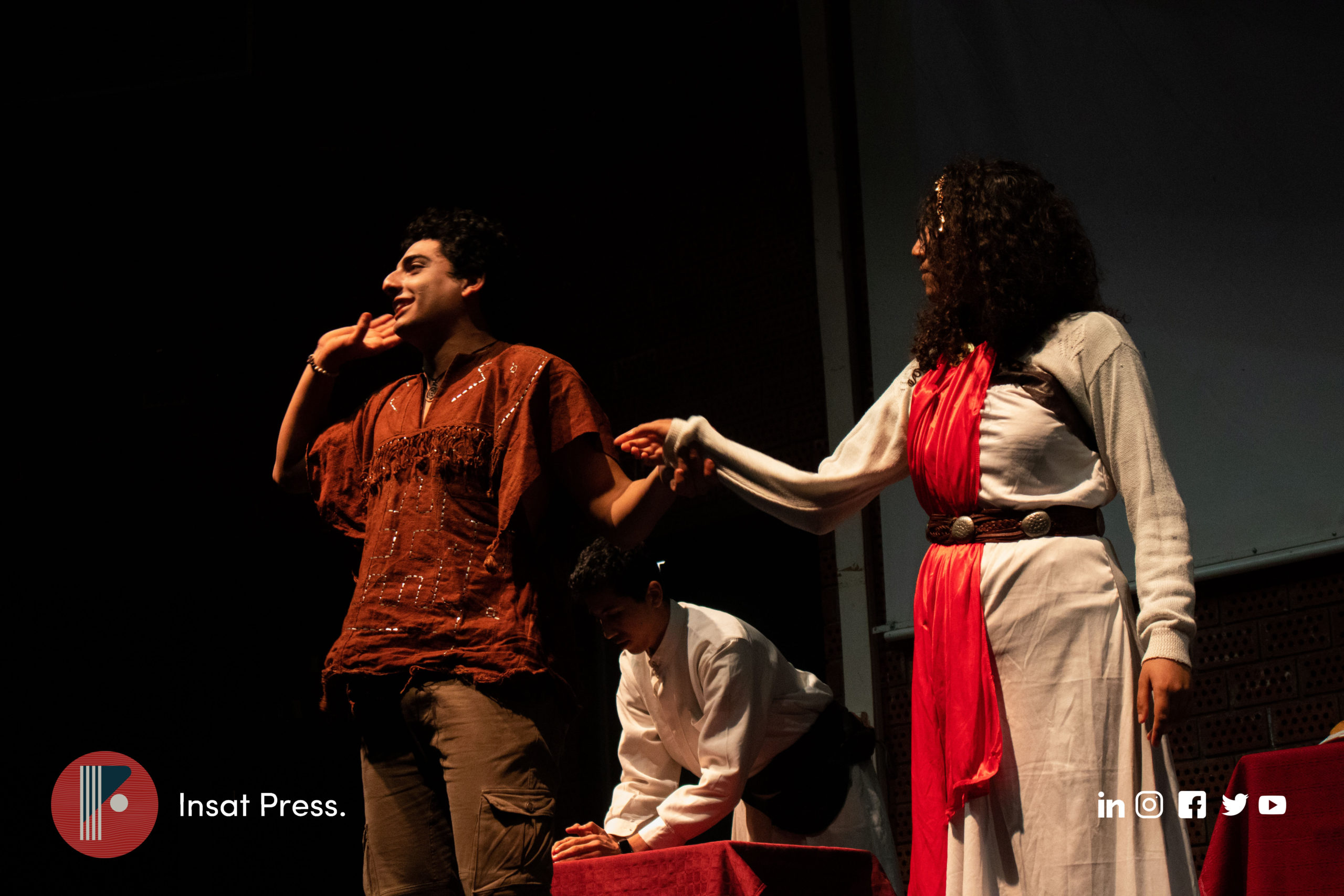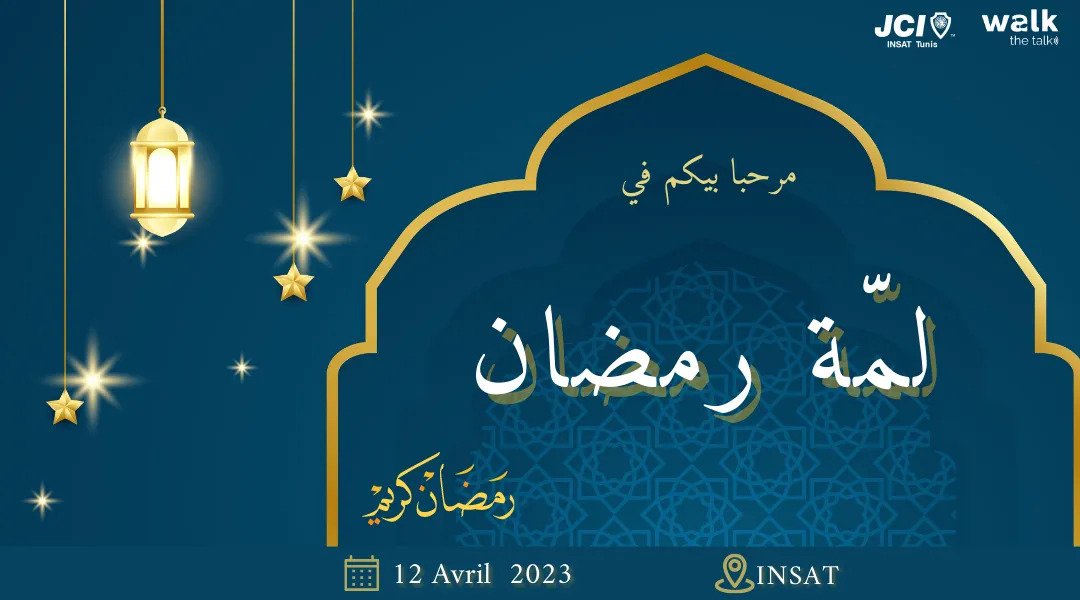UniLife
JTI : Tunisia Lost in History.
Published
3 ans agoon
[simplicity-save-for-later]
The Theatrical Days of INSAT (JTI), INSAT Theatro’s yearly event, had always been a much-anticipated highlight of INSAT’s calendar, and this year’s edition, entitled « Tunisia Lost in History » was no exception. The event had sold out within 40 minutes, with over 600 tickets snapped up, promising a truly special and unforgettable experience.
A highly anticipated event …
As we made our way into the grand auditorium and settled into our plush velvet chairs, the anticipation in the air was palpable. The atmosphere was electric, with hundreds of people milling around, chatting excitedly about the upcoming show. The grand auditorium was transformed into an immersive theatrical space, with stunning lights and sound effects that transported us to a different time and place.
As the lights began to dim and the audience settled into a hushed silence, Akram Attouchi, the club president, stepped onto the stage to deliver his opening speech. The passion and enthusiasm in his voice were infectious as he spoke of the incredible amount of hard work and dedication that the team had put into delivering this masterpiece. He thanked the audience for their support and wished everyone a happy watch before leaving the stage, leaving us eager for the show to begin.
And then, the trailer began, immediately setting the tone for what’s coming. The anticipation was building, and we all knew that we were about to embark on a magical journey through time.
… that delivered on its promises,
What followed was a breathtaking, three-hour journey filled with comedy, drama, and everything in between. The play masterfully took us through a magical and unforgettable journey through time, celebrating Tunisia’s diverse cultures and complex history. We laughed and cried, cheered and gasped, swept up in the magic of the moment. The actors brought their characters to life with an incredible level of authenticity and emotion, drawing us in and keeping us captivated from start to finish.
With its relatable protagonists,
The play had a gripping opening as we were introduced to the three main characters: Baya, Adnen, and Touhemi; three friends who found themselves thrown back in time to different periods of Tunisia’s history. Each character had a unique personality and brought their own strengths and weaknesses to the team.
Baya was the intellectual of the group, always using her sharp mind to guide them through their journey. Her resourcefulness and creativity were evident throughout the play as she helped her friends navigate their way through different time periods and cultures. Despite the societal expectations for women, especially in the older ages they were teleported to, Baya refused to be confined to traditional gender roles. Throughout the play, we saw her constantly fighting to assert her worth, be heard, and treated as an equal. Her unwavering determination and fierce spirit were truly inspiring.
Adnen, on the other hand, was the adventurer of the group. With his laid-back attitude and quick wit, he was always ready to jump headfirst into any challenge that came their way. He was the glue that held the group together, providing a lighthearted energy and a sense of humor that helped them overcome the many obstacles they faced. Adnen’s cheerful demeanor was often a source of comic relief, and especially his interactions with Touhemi; but we also saw him step up and show his bravery when it mattered most.
Touhemi was the heart and emotional center of the group. He struggled with his own fears, but his compassion and empathy made him a vital member of the team. We saw him grow and evolve throughout the play, as he came out of his shell and took on a more active role in the group, gaining confidence and finding his own voice.
Together, Baya, Adnen, and Touhemi formed a close-knit group that complemented each other’s strengths and weaknesses. Their friendship was tested and strengthened as they faced numerous challenges on their journey through time, but they always found a way to come together and support each other. The play’s characters were not only entertaining but also relatable, making their journey all the more impactful.
And its hidden societal critique,
The play’s central plot revolves around our trio of friends who find themselves transported back in time to different eras in Tunisian history. They embark on a daring mission to steal three artifacts from different cultures that will allow them to return to their own time. They face numerous challenges on their journey, from navigating unfamiliar customs and cultures to outwitting dangerous foes. Throughout the play, we see the three protagonists’ interactions with the locals, including historical figures like Hannibal and Uqba ibn Nafi.
The characters’ journeys are entertaining and full of humor, and although comedy was central to the play, you would be mistaken to think that’s what it’s all about. In fact, the play goes much deeper than that and provides a thoughtful critique of Tunisian society’s past and present. For example, the play explores the role of women in society, highlighting the many ways in which women have contributed to Tunisian history despite facing significant obstacles.
One of the play’s most impactful themes is tolerance, acceptance, and understanding. By showing the protagonists’ encounters with different cultures and time periods, the play emphasizes the importance of empathy and the dangers of prejudice. It’s a powerful reminder of Tunisia’s rich and complex history, which has been shaped by centuries of conflict and cultural exchange.
The play also makes clever use of parallel characters in different time periods, portrayed by the same actor. This approach emphasizes the ways in which certain societal issues and character traits persist across time, highlighting the timelessness of human nature. For example, we saw the drunk guy in every time period, whether he was named Bal’aabal, Boulayaa, or Balaaros.
It was a true celebration of the arts in all its forms,
The actors’ performances were exceptional, bringing to life characters that were both complex and relatable. We were drawn into their struggles and felt their pain and triumphs as if they were our own.
But true to its traditions, JTI wasn’t just about acting, but rather a true celebration of the arts in all its forms. The play was filled with artistic pauses, showcasing the immense talent of the cast and crew. Yes, we have artistic pauses in between artistic performances in INSAT, that’s just how good we are.
These moments never feel out of place but instead serve to deepen our connection to the story and characters accentuate the feeling of immersion. They seamlessly integrated into the storyline, adding depth and dimension to the play’s themes and characters.
The Carthaginian bars were brought to life with lively and colorful dance routines, featuring dancers in traditional clothing and music that perfectly captured the atmosphere of the time period. The Arab dancers on « Desert Rose » and « Arabian Night » were equally captivating, their movements fluid and graceful, telling a story through dance that words could never fully capture.
The Amazigh priestess Om Lkehna’s performance was truly exceptional, singing the famous Kabyle song « A Vava Inouva » while sharing its story around a campfire. Her voice was hauntingly beautiful, bringing tears to the eyes of many in the audience. And let’s not forget the mesmerizing mermaids encountered by our protagonists on their journey, their ethereal presence and enchanting voices leaving us spellbound.
These moments weren’t just entertaining, but also emotionally impactful, leaving a lasting impression on the audience.
And a long-lasting tradition.
JTI’s annual theater production has become a long-standing tradition at INSAT, demonstrating the students’ diverse talents beyond just their engineering skills. The play concludes with a nod to the previous year’s edition, showcasing the continuity and commitment to the tradition. In the final scene, Stoura calls out « الميت رقم 7 مليارات و 8 ميا و خمسة و ستين » , a popular phrase in last year’s production. This serves as a reminder of the continuity of the tradition and the importance of preserving it for future generations of INSAT students.
The final scene of Touhemi dressed in a banana costume adds a comedic touch to the finale, a funny death for a funny character.
Overall, JTI’s theatrical piece is a testament to the creativity and multidisciplinary talents of INSAT students and serves as a celebration of their diverse abilities. The tradition has become a beloved part of the INSAT community, showcasing the students’ ability to work together and create something truly special.
Written By : Younes Makhlouf.
Articles similaires
You may like

اشرأبت الأعناق، تركزت الأبصار وخفقت القلوب، هلال رمضان قد هل علينا. هي ايام معدودات لكنها مثلت في الذّات العربية المسلمة عادة تتجلى في كل تفاصيل يومه، وما يكتمل هذا التجلّي الا مع الجماعة، عائلة كانت او أصدقاء. توالت السنين ، وأخذت منا الحياة مأخذها، لنجد أنفسنا جزء من المجتمع الطلابي بعد أن كنا تحت كنف العائلة، لتتحول جدران البيت إلى جدران لم نعهدها سابقا، وصوت الأذان التي ألفناه و ابتسامة طُبعت على الفاه اثر سماعها إلى أصوات ذات ترددات مختلفة لتختلف باختلافها ابتساماتنا، وطاولة الإفطار التي كانت تعج بشهوات العائلة .كل فرد وما اشتهى إلى أطباق حاملة ابداعاتنا الخاصة وجهدنا الكبير في التفكير فيها واعدادها. كلّ وحكاياته في هذه الحياة ، كلّ وتجربته الخاصة مع رمضان، كلّ وما عاشه من مشاعر وأحاسيس. ولكن الحكايات ستصبح حكاية والامكنة مكان واحد يحتضن جميع الطلبة من ابتعد منهم عن أهله ومن مازال حذوهم، والزمان رحلة عبر التاريخ. كل هذا سيتجلى خلال « لمة رمضان » اللقاء المنظم من قبل الغرفة الفتية الاقتصادية بالمعهد الوطني للعلوم التطبيقية والتكنولوجيا، والذي سيجمع أوصال الطلبة في جو من الدفئ والمتعة والمفاجآت. فلكل من أراد لنفسه استراحة محارب وسويعات يتلفظ فيها أنفاسه من تعب الحياة وفرصة لتكوين صداقات جديدة وتوطيد علاقات كان قد ابتدأت وعيش تجربة مختلفة، هو على موعد – يوم الأربعاء 12 أفريل 2023 بالمعهد الوطني للعلوم التطبيقية والتكنولوجيا- مع إفطار جماعي وأكل شهي و من ثمة ألعاب و عرض موسيقي ومسرحي في جو سحري واخيرا سهرا صوفيا مع الحضرة وأجواء نارية تسرّ الناظرين. احبسوا أنفاسكم و تأهبوا فليلة الأربعاء هذه ستكون ليلة في الحياة وتجربة راسخة في العقول والأذهان.ق




Share your thoughts